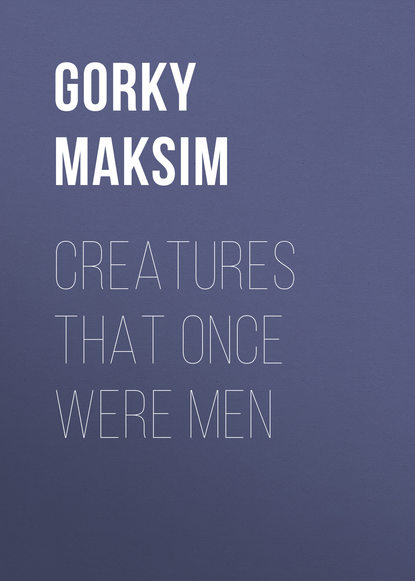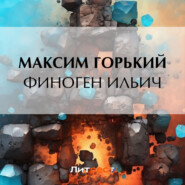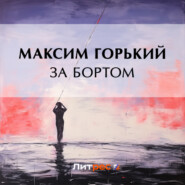По всем вопросам обращайтесь на: info@litportal.ru
(©) 2003-2025.
✖
Creatures That Once Were Men
Настройки чтения
Размер шрифта
Высота строк
Поля
"No, wait a minute! What's the point? What pinetree?"
Our baker did not answer, working rapidly away with the shovel at the oven; flinging into it the half-cooked kringels, taking out those that were done, and noisily throwing them on the floor to the boys who were stringing them on bast. He seemed to have forgotten the soldier and his conversation with him. But the soldier had all at once dropped into a sort of uneasiness. He got up on to his feet, and went to the oven, at the risk of knocking against the handle of the shovel, which was waving spasmodically in the air.
"No, tell me, do – who is it? You've insulted me. I? There's not one could withstand me, n-no! And you say such insulting things to me?"
He really seemed genuinely hurt. He must have had nothing else to pride himself on except his gift for seducing women; maybe, except for that, there was nothing living in him, and it was only that by which he could feel himself a living man.
There are men to whom the most precious and best thing in their lives appears to be some disease of their soul or body. They spend their whole life in relation to it, and only living by it, suffering from it, they sustain themselves on it, they complain of it to others, and so draw the attention of their fellows to themselves.
For that they extract sympathy from people, and apart from it they have nothing at all. Take from them that disease, cure them, and they will be miserable, because they have lost their one resource in life – they are left empty then. Sometimes a man's life is so poor, that he is driven instinctively to prize his vice and to live by it; one may say for a fact that often men are vicious from boredom.
The soldier was offended, he went up to our baker and roared:
"No, tell me do-who?"
"Tell you?" the baker turned suddenly to him.
"Well?"
"You know Tanya?"
"Well?"
"Well, there then! Only try."
"You!"
"Her? Why that's nothing to me-pooh!"
"We shall see!"
"You will see! Ha! ha!"
"She'll – "
"Give me a month!"
"What a braggart you are, soldier!"
"A fortnight! I'll prove it! Who is it? Tanya! Pooh!"
"Well, get out. You're in my way!"
"A fortnight – and it's done! Ah, you – "
"Get out, I say!"
Our baker, all at once, flew into a rage and brandished his shovel. The soldier staggered away from him in amazement, looked at us, paused, and softly, malignantly said, "Oh, all right, then!" and went away.
During the dispute we had all sat silent, absorbed in it. But when the soldier had gone, eager, loud talk and noise arose among us.
Some one shouted to the baker: "It's a bad job that you've started, Pavel!"
"Do your work!" answered the baker savagely.
We felt that the soldier had been deeply aggrieved, and that danger threatened Tanya. We felt this, and at the same time we were all possessed by a burning curiosity, most agreeable to us. What would happen? Would Tanya hold out against the soldier? And almost all cried confidently: "Tanya? She'll hold out! You won't catch her with your bare arms!"
We longed terribly to test the strength of our idol; we forcibly proved to each other that our divinity was a strong divinity and would come victorious out of this ordeal. We began at last to fancy that we had not worked enough on the soldier, that he would forget the dispute, and that we ought to pique his vanity more keenly. From that day we began to live a different life, a life of nervous tension, such as we had never known before. We spent whole days in arguing together; we all grew, as it were, sharper; and got to talk more and better. It seemed to us that we were playing some sort of game with the devil, and the stake on our side was Tanya. And when we learned from the bakers that the soldier had begun "running after our Tanya," we felt a sort of delighted terror, and life was so interesting that we did not even notice that our employer had taken advantage of our pre-occupation to increase our work by fourteen pounds of dough a day.
We seemed, indeed, not even tired by our work. Tanya's name was on our lips all day long. And every day we looked for her with a certain special impatience. Sometimes we pictured to ourselves that she would come to us, and it would not be the same Tanya as of old, hut somehow different. We said nothing to her, however, of the dispute regarding her. We asked her no questions, and behaved as well and affectionately to her as ever. But even in this a new element crept in, alien to our old feeling for Tanya – and that new element was keen curiosity, keen and cold as a steel knife.
"Mates! To-day the time's up!" our baker said to us one morning, as he set to work.
We were well aware of it without his reminder; but still we were thrilled.
"Look at her. She'll he here directly," suggested the baker.
One of us cried out in a troubled voice, "Why! as though one could notice anything!"
And again an eager, noisy discussion sprang up among us. To-day we were about to prove how pure and spotless was the vessel into which we had poured all that was best in us. This morning, for the first time, it became clear to us, that we really were playing a great game; that we might, indeed, through the exaction of this proof of purity, lose our divinity altogether.
During the whole of the intervening fortnight we had heard that Tanya was persistently followed by the soldier, but not one of us had thought of asking her how she had behaved toward him. And she came every morning to fetch her kringels, and was the same toward us as ever.
This morning, too, we heard her voice outside: "You poor prisoners!
Here I am!"
We opened the door, and when she came in we all remained, contrary to our usual custom, silent. Our eyes fixed on her, we did not know how to speak to her, what to ask her. And there we stood in front of her, a gloomy, silent crowd. She seemed to be surprised at this unusual reception; and suddenly we saw her turn white and become uneasy, then she asked, in a choking voice:
"Why are you – like this?"
"And you?" the baker flung at her grimly, never taking his eyes off her.
"What am I?"
"N – nothing."
"Well, then, give me quickly the little kringels."
Never before had she bidden us hurry.
"There's plenty of time," said the baker, not stirring, and not removing his eyes from her face.
Then, suddenly, she turned round and disappeared through the door.
The baker took his shovel and said, calmly turning away toward the oven:
"Well, that settles it! But a soldier! a common beast like that – a low cur!"
Our baker did not answer, working rapidly away with the shovel at the oven; flinging into it the half-cooked kringels, taking out those that were done, and noisily throwing them on the floor to the boys who were stringing them on bast. He seemed to have forgotten the soldier and his conversation with him. But the soldier had all at once dropped into a sort of uneasiness. He got up on to his feet, and went to the oven, at the risk of knocking against the handle of the shovel, which was waving spasmodically in the air.
"No, tell me, do – who is it? You've insulted me. I? There's not one could withstand me, n-no! And you say such insulting things to me?"
He really seemed genuinely hurt. He must have had nothing else to pride himself on except his gift for seducing women; maybe, except for that, there was nothing living in him, and it was only that by which he could feel himself a living man.
There are men to whom the most precious and best thing in their lives appears to be some disease of their soul or body. They spend their whole life in relation to it, and only living by it, suffering from it, they sustain themselves on it, they complain of it to others, and so draw the attention of their fellows to themselves.
For that they extract sympathy from people, and apart from it they have nothing at all. Take from them that disease, cure them, and they will be miserable, because they have lost their one resource in life – they are left empty then. Sometimes a man's life is so poor, that he is driven instinctively to prize his vice and to live by it; one may say for a fact that often men are vicious from boredom.
The soldier was offended, he went up to our baker and roared:
"No, tell me do-who?"
"Tell you?" the baker turned suddenly to him.
"Well?"
"You know Tanya?"
"Well?"
"Well, there then! Only try."
"You!"
"Her? Why that's nothing to me-pooh!"
"We shall see!"
"You will see! Ha! ha!"
"She'll – "
"Give me a month!"
"What a braggart you are, soldier!"
"A fortnight! I'll prove it! Who is it? Tanya! Pooh!"
"Well, get out. You're in my way!"
"A fortnight – and it's done! Ah, you – "
"Get out, I say!"
Our baker, all at once, flew into a rage and brandished his shovel. The soldier staggered away from him in amazement, looked at us, paused, and softly, malignantly said, "Oh, all right, then!" and went away.
During the dispute we had all sat silent, absorbed in it. But when the soldier had gone, eager, loud talk and noise arose among us.
Some one shouted to the baker: "It's a bad job that you've started, Pavel!"
"Do your work!" answered the baker savagely.
We felt that the soldier had been deeply aggrieved, and that danger threatened Tanya. We felt this, and at the same time we were all possessed by a burning curiosity, most agreeable to us. What would happen? Would Tanya hold out against the soldier? And almost all cried confidently: "Tanya? She'll hold out! You won't catch her with your bare arms!"
We longed terribly to test the strength of our idol; we forcibly proved to each other that our divinity was a strong divinity and would come victorious out of this ordeal. We began at last to fancy that we had not worked enough on the soldier, that he would forget the dispute, and that we ought to pique his vanity more keenly. From that day we began to live a different life, a life of nervous tension, such as we had never known before. We spent whole days in arguing together; we all grew, as it were, sharper; and got to talk more and better. It seemed to us that we were playing some sort of game with the devil, and the stake on our side was Tanya. And when we learned from the bakers that the soldier had begun "running after our Tanya," we felt a sort of delighted terror, and life was so interesting that we did not even notice that our employer had taken advantage of our pre-occupation to increase our work by fourteen pounds of dough a day.
We seemed, indeed, not even tired by our work. Tanya's name was on our lips all day long. And every day we looked for her with a certain special impatience. Sometimes we pictured to ourselves that she would come to us, and it would not be the same Tanya as of old, hut somehow different. We said nothing to her, however, of the dispute regarding her. We asked her no questions, and behaved as well and affectionately to her as ever. But even in this a new element crept in, alien to our old feeling for Tanya – and that new element was keen curiosity, keen and cold as a steel knife.
"Mates! To-day the time's up!" our baker said to us one morning, as he set to work.
We were well aware of it without his reminder; but still we were thrilled.
"Look at her. She'll he here directly," suggested the baker.
One of us cried out in a troubled voice, "Why! as though one could notice anything!"
And again an eager, noisy discussion sprang up among us. To-day we were about to prove how pure and spotless was the vessel into which we had poured all that was best in us. This morning, for the first time, it became clear to us, that we really were playing a great game; that we might, indeed, through the exaction of this proof of purity, lose our divinity altogether.
During the whole of the intervening fortnight we had heard that Tanya was persistently followed by the soldier, but not one of us had thought of asking her how she had behaved toward him. And she came every morning to fetch her kringels, and was the same toward us as ever.
This morning, too, we heard her voice outside: "You poor prisoners!
Here I am!"
We opened the door, and when she came in we all remained, contrary to our usual custom, silent. Our eyes fixed on her, we did not know how to speak to her, what to ask her. And there we stood in front of her, a gloomy, silent crowd. She seemed to be surprised at this unusual reception; and suddenly we saw her turn white and become uneasy, then she asked, in a choking voice:
"Why are you – like this?"
"And you?" the baker flung at her grimly, never taking his eyes off her.
"What am I?"
"N – nothing."
"Well, then, give me quickly the little kringels."
Never before had she bidden us hurry.
"There's plenty of time," said the baker, not stirring, and not removing his eyes from her face.
Then, suddenly, she turned round and disappeared through the door.
The baker took his shovel and said, calmly turning away toward the oven:
"Well, that settles it! But a soldier! a common beast like that – a low cur!"

















